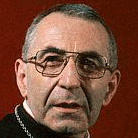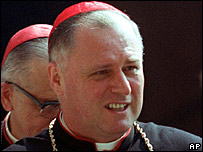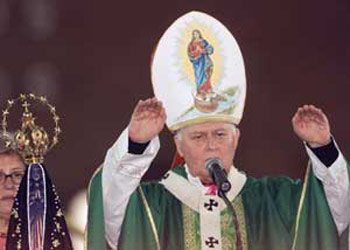| Sitemap | Search | Contact | | ||
 |
 |
 |
| Home > Testimonies and Anecdotes |
Cardinal Aloísio LorscheiderWe publish here belowsome excerpts taken from the interview given to 30Days in August 1998 by Cardinal Aloísio Lorscheider on the occasion of the twentieth anniversary of the Conclave that led to the election of Pope Luciani
Interview with Cardinal Aloísio Lorscheider by Sefania Falasca Aloísio Lorscheider: The last time I saw Paul VI was toward the end of his Pontificate, in the course of the visit to the Vatican of the presidents of several Bishops’ Conferences. I remember that Paul VI came up to me, embraced me and said: “You Brazilian bishops are the ones who are washing the feet of the poor today”. He said it in that particular voice he had, almost hoarse, quiet and quavering, and then he added: “How I would like to wash the feet of the poor ...”. I’ll never forget that moment and Paul VI’s voice as he said those words. What always struck me about Paul VI was his concentration and his extreme realism, a profoundly felt realism in judging the world and the Church that marked his Pontificate from the years immediately after the Second Vatican Council. Lorscheider:Paul VI held Albino Luciani in great esteem: he had named him Patriarch of Venice, a most important See, and Luciani wrote pieces for Paul VI on the Concordat and on the right to life. Then there was that ‘prophetic’ episode in 1972 in Venice, a few months before Luciani was made cardinal. Before an immense crowd packing Saint Mark’s Square, Paul VI took the pontifical stole off his shoulders and put it on the Patriarch and said: “You deserve this stole”. Poor Luciani blushed deeply. I believe that not only was the Patriarch of Venice the successor Paul VI hoped for but that of all of them he was the one who would have best followed and did follow the basic tendencies of his Magisterium. Lorscheider: As far as I know there had been no preparation. I personally had a certain understanding with Cardinal Arns, but of the other three Brazilian cardinals, for example, I wouldn’t know if any of them knew Luciani well. Albino Luciani was not very well known to the Brazilian Bishops’ Conference. His name did not even appear in the lists of papabili that appeared in the press, so much so that just before the conclave opened, I remember a journalist coming to me with a list of names. Reading it, I pointed out that the name of the Patriarch of Venice was missing. It was an off-the-cuff remark ... in all innocence. And he thanked me because the name had never occurred to him. Lorscheider: Those features expressed no more than the feelings of that College of Cardinals. The fundamental point was that we wanted a pope who was first of all a good pastor. The idea was for an Italian, not a man of the Curia. The name of Albino Luciani came out during the Conclave. Lorscheider: After the first ballots it didn’t look as if it would be a brief conclave. Then, all of a sudden, agreement regarding the Patriarch of Venice came thick and fast. For me that outcome was the providential work of the Holy Spirit. But it is precisely that unanimity that shows that he was not a Pope meant to head a specific political project. With the election of Luciani the opposition between conservative and progressives broke up, precisely for those qualities mentioned earlier and for the distinctive characteristics of Luciani, who was focused on the essentials. Lorscheider: From the position in which I found myself in the hall I could see his face well ... Luciani paled and he answered the ritual question asked him by Cardinal Villot in a thread of a voice: “I accept”. When we then went to pay him homage he kept on saying to everyone: “What have you done? May God forgive you for what you have done ...”. “Holy Father, take courage, God won’t abandon you”, some of them answered, and he: “I am a poor pope”. Again on August 30, at the first audience with the cardinals he said: “I hope that you cardinals will help this poor Christ, the Vicar of Christ, to carry the Cross”. The way he said those words made a strong impression on me. It was the Pope saying this. His humble humanity was not a front. It was the artless humility that comes from the awareness of being poor sinners and from the experience of forgiveness. Lorscheider: I remember that John Paul I called a child to him and with great simplicity began to speak to him about the catechism. I had the absolute certainty in that moment that he was the right man: a Pope who behaves like a parish priest, who reasons like a parish priest ... What greater gift could the Church have? Lorscheider: It’s difficult to tell. But we can base ourselves on what he had already shown himself to be. The quality that would have marked his Magisterium would have been without doubt an evangelical simplicitas. In his programmatic discourse Luciani explicitly declared his intention to be faithful only to the great discipline of the Church that goes back to the font of the faith. Hence simple words, few discourses, brief and within the scope of all. He said that his homilies must be understood by the most uncultured of people. He would then devote particular attention to the diocese of Rome and at the same time would back collegiality by concretely involving the bishops and cardinals in pastoral government. He would certainly have kept in mind the Church’s predilection for the poor. Luciani for long years kept the letter from his socialist father giving him permission enter the seminary: “I hope that when you are priest you will be on the side of the poor and of the workers because Christ was on their side”. And several times Luciani recalled having been impressed by that point in the catechism where it says that defrauding workers of their wages is a sin crying to heaven for vengeance. That, for Luciani, was the criterion by which to judge economic and political questions, and from this came his sometimes very severe judgements on capitalism and the exploitation of the Third World. Lorscheider: One can only engage in conjecture. For sure he would not have gone against Humanae vitae since he gave full adherence to the pronouncement of Paul VI, whose point of view he set out for the faithful: “The traditional doctrine is a better guarantee of the true good of man and of the family”. But for him the question was of more practical than theoretical interest: he was concerned for the human relationship with the faithful. That is, I believe he probably would not have insisted on the matter, stressing the mercy of God toward the sinner rather than the coherence of man. This aspect is frequently expressed by Luciani in many of his speeches: “No sin is too great, none greater than the mercy of God”. Lorscheider: On the contrary, I would say that his pastoral simplicity and his being himself were precisely his strengths. It is certainly no sign of weakness to want always to be oneself and not add anything to the elements and to the essential functions of the Primacy of Peter. Indeed, that would also have brought changes to the structure of the Church, to the Curia and to the Pope’s relationship with the bishops. Lorscheider: John Paul I was well aware that it is not the pope who makes the Church. “We priests”, he often said, “can instruct, enlighten, even convince, but no more. Only the grace of God could touch the heart and convert”. Lorscheider: It was the day of his enthronement. I then had no more contact with him. But Bishop Ivo Lorscheiter did have the good fortune to be received at lunch by John Paul I during the 33 days of his Pontificate. He told me about their extremely friendly and cordial meeting and he told me that the Pope had appreciated the interview I had given to Avvenire as President of the CELAM on the Conference of the Latin American Church arranged in Puebla. Lorscheider: I knew the Pope would not be coming. I think his priority at that moment was to stay in Rome, whose Bishop he had so recently become.
www.30giorni.it/us/articolo.asp
|
| ©2005 Webmaster |


